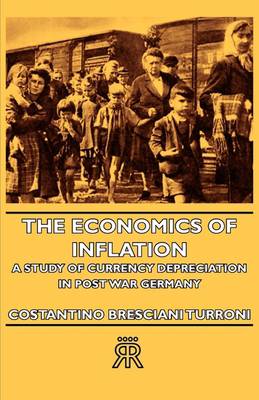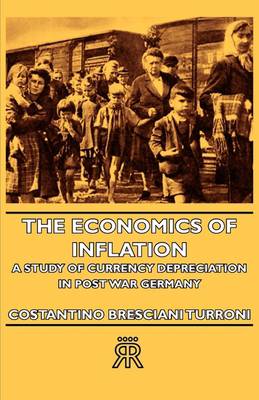
- Afhalen na 1 uur in een winkel met voorraad
- Gratis thuislevering in België vanaf € 30
- Ruim aanbod met 7 miljoen producten
- Afhalen na 1 uur in een winkel met voorraad
- Gratis thuislevering in België vanaf € 30
- Ruim aanbod met 7 miljoen producten
Zoeken
The Economics of Inflation - A Study of Currency Depreciation in Post War Germany
Costantino Bresciani-Turroni, Lionel Robbins
Paperback | Engels
€ 54,45
+ 108 punten
Uitvoering
Omschrijving
The depreciation of the mark of 1914-23, which is the subject of this work, is one of the outstanding episodes in the history of the twentieth century. Not only by reason of its magnitude but also by reason of its effects, it looms large on our horizon. It was the most colossal thing of its kind in history: and, next probably to the Great War itself, it must bear responsibility for many of the political and economic difficulties of our generation. It destroyed the wealth of the more solid elements in German society: and it left behind a moral and economic disequilibrium, apt breeding ground for the disasters which have followed. Hitler is the foster-child of the inflation. The financial convulsions of the Great Depression were, in part at least, the product of the distortions of the system of international borrowing and lending to which its ravages had given rise. If we are to understand correctly the present position of Europe, we must not neglect the study of the great German inflation. If we are to plan for greater stability in the future, we must learn to avoid the mistakes from which it sprang. There is another reason why the history of this episode is peculiarly significant to students of the social sciences. Accidents to the body politic, like accidents to the physical body, often permit observations of a kind which would not be possible under normal conditions. In peaceful times we may speculate concerning the consequences of violent change. But we are naturally precluded from verifying our conclusions: we cannot upset the smooth current of things for the advancement of abstract knowledge. But when disturbance takes place, it is sometimes possible to snatch good from evil and to obtain insight into the working of processes which are normally concealed. No doubt there are dangers here. We must not ignore the possibility that the processes thus revealed are themselves abnormal: we must not infer, for instance, that propositions which apply to large inflations necessarily apply, without modification, to small inflations. But the dangers are clear: it is net difficult to keep them in mind and to guard against them. And the opportunities of fruitful research are enormous. In this matter of the depreciation of the mark, there is hardly any branch of the theory of economic dynamics which is not illuminated by examination of its grim events. For both these reasons, therefore, I hope that this book will obtain a wide circulation among the English-speaking public.
Specificaties
Betrokkenen
- Auteur(s):
- Uitgeverij:
Inhoud
- Aantal bladzijden:
- 468
- Taal:
- Engels
Eigenschappen
- Productcode (EAN):
- 9781406722413
- Verschijningsdatum:
- 22/09/2006
- Uitvoering:
- Paperback
- Formaat:
- Trade paperback (VS)
- Afmetingen:
- 140 mm x 216 mm
- Gewicht:
- 589 g

Alleen bij Standaard Boekhandel
+ 108 punten op je klantenkaart van Standaard Boekhandel
Beoordelingen
We publiceren alleen reviews die voldoen aan de voorwaarden voor reviews. Bekijk onze voorwaarden voor reviews.











